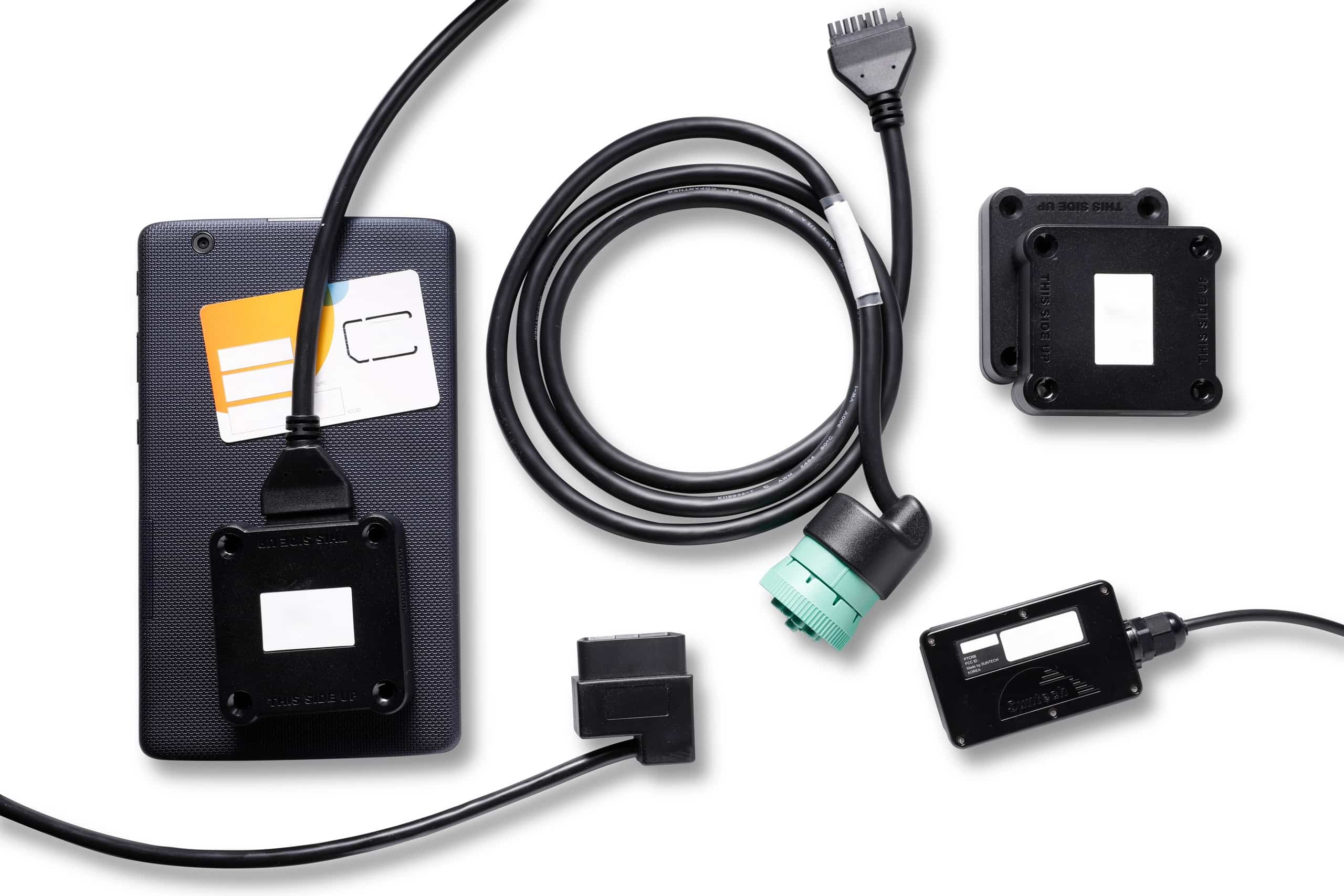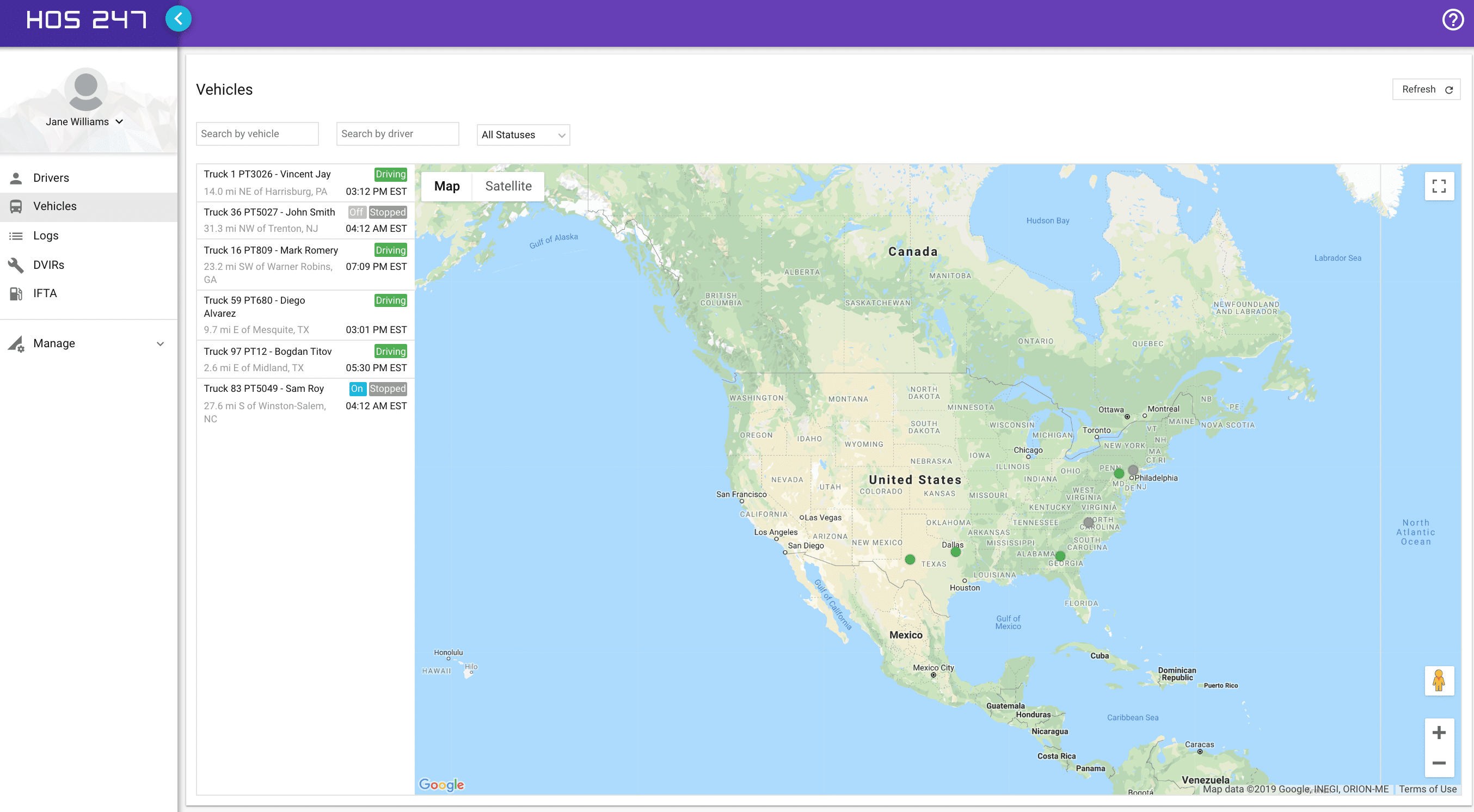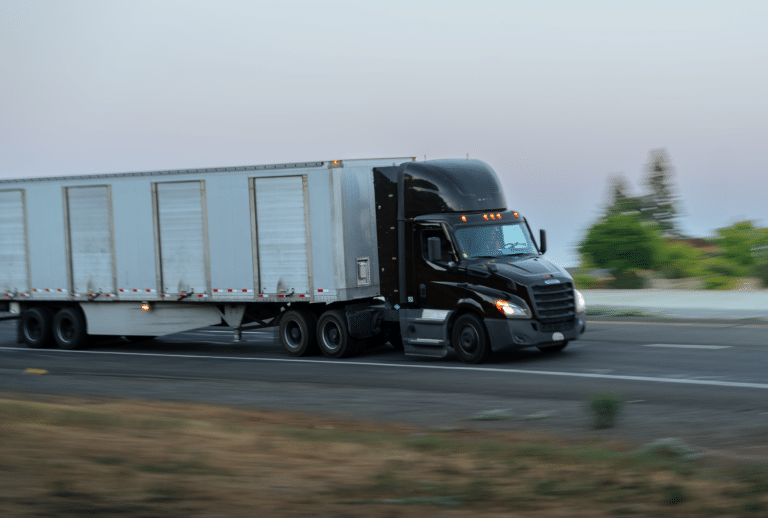For most trucking professionals, the Electronic Logging Device (ELD) is a key tool for Hours of Service (HOS) compliance. Owner-operators and carriers can get more value from this tool by choosing a reliable, easy-to-use system that also streamlines other parts of the business.
An ELD with IFTA reporting capabilities is a major advantage. A quality ELD already tracks your truck’s location and mileage for HOS. Using that same data to automatically calculate your miles-per-jurisdiction for IFTA is one of the smartest ways to get more value from your provider.
This guide covers the powerful link between ELD and IFTA tools and what to look for in a system to help you stay compliant and efficient.
Do you have any questions? Talk to ELD Advisor: 650-405-3372 or Request Callback
Understanding the IFTA and ELD Connection
A compliant ELD connects to the truck’s engine and uses GPS to track when and where you are driving for HOS. This means the system is already collecting two crucial pieces of data: your truck’s precise location and the exact miles you drive. This existing data is the key to simplifying your fuel tax reporting.
What is IFTA (International Fuel Tax Agreement)?
IFTA is an agreement between the lower 48 U.S. states and 10 Canadian provinces. Its purpose is to simplify the process of reporting and paying fuel taxes for carriers who operate in multiple jurisdictions.
Instead of filing separate reports for every state, IFTA allows you to:
- Get one IFTA license for your entire fleet.
- File just one quarterly IFTA tax report with your “base jurisdiction” (your home state).
Your base jurisdiction then distributes the taxes to all the other jurisdictions where you operated.
How an ELD with IFTA Capabilities Helps
To file your quarterly IFTA report, you must provide accurate data on fuel purchased and total miles driven in each jurisdiction. An ELD with IFTA capabilities uses the precise GPS data it’s already collecting for HOS to automatically calculate your miles driven in each state or province.
This feature provides you with the accurate mileage data needed for your report. It streamlines the process, allowing drivers to focus on the road and giving fleet managers the exact numbers they need for a timely and accurate filing.

What to Look For in an ELD with IFTA Reporting
Choosing a dependable ELD with strong IFTA capabilities helps you get more value from your system. Here are the key features to look for when evaluating providers.
Your Checklist for Choosing an ELD with IFTA
- Accurate miles-per-state calculation. The system must automatically and reliably calculate all miles driven in each jurisdiction.
- Easy-to-access reports. The back-office portal should be intuitive and allow managers to pull quarterly mileage data in just a few clicks.
- Dedicated customer support. You should be able to reach a real person who understands trucking, especially when you are on a deadline to file your IFTA report.
- Reliable hardware. The ELD must maintain a stable GPS and engine connection to ensure all mileage data is captured.
- Provider reputation. Look for positive reviews from other trucking professionals on reliability, ease of use, and overall service.
The Benefits of an Integrated System
A smart solution that checks all these boxes provides clear advantages.
- Automated mileage capture. The system’s GPS automatically tracks and sorts every mile driven by jurisdiction.
- Streamlined data entry. This automation provides the official mileage numbers, giving staff the data they need without manual calculation from trip sheets.
- Increased filing accuracy. Using direct, ELD-generated data helps ensure your mileage reports are precise and correct.
- Support for smooth audits. Providing a clean, GPS-generated mileage report is a straightforward way to support your filings.
- Time and cost savings. You reduce the administrative hours spent preparing IFTA reports, freeing up your team to focus on revenue-generating tasks.
Finding a provider that delivers on these points does more than simplify one quarterly task. The benefits of an integrated system are felt by everyone in your operation.

How an ELD and IFTA Reporting System Benefits Your Whole Team
An integrated system makes work more efficient for everyone involved in your operation.
For Fleet Managers
Fleet managers see the most significant time-saving. Instead of compiling numbers from multiple sources, you can simply run a report. This streamlines the quarterly process by hours. It also gives you clear oversight, allowing you to check mileage data at any time.
For Drivers
An ELD support allows drivers to focus on driving safely and managing their HOS. The IFTA feature automatically logs miles per jurisdiction, so drivers have one less item to track manually.
For Compliance and Audits
A system that provides clean, accurate, GPS-based mileage records helps you maintain audit-ready files. This data provides clear, computer-generated documentation to support your filings.
For Business Owners
For an owner-operator or fleet owner, all of these benefits translate directly to the bottom line.
- Cost savings. You reduce the administrative hours spent on IFTA preparation and ensure your filings are accurate.
- Better resource allocation. Your staff can focus on managing operations, dispatch, and safety instead of being buried in paperwork.
- Scalability. As your fleet grows, an automated system scales with you, allowing you to add trucks with consistent, streamlined IFTA preparation.
From the driver to the owner, a reliable system for IFTA and ELD HOS tracking improves efficiency. These benefits are realized when you choose a provider focused on reliability and support.
HOS247 as Your Trusted ELD and IFTA Reporting Partner
Many drivers and fleet managers switch providers because they need a system that is, above all, reliable. They look for an ELD that just works, an app that is easy to use, and a support team that is available when needed.
The HOS247 platform is built to be this dependable ELD solution, focusing on a solid, user-friendly system and accessible customer support.
What Drivers and Managers Get with HOS247
- Top-rated customer support. A multilingual support team, based in North America, is available Monday through Sunday to help resolve any issues.
- Dependable, easy-to-use hardware. The HOS247 ELD is simple for drivers to install and maintains a stable connection to capture all log data.
- No long-term contracts. Plans are flexible and transparent, allowing a business to scale or adjust as needed.
- A reliable, FMCSA-compliant platform. The system is registered and stable, designed to make HOS compliance straightforward.
How HOS247 Simplifies ELD with IFTA Tasks
On top of this reliable foundation for HOS, the platform provides advanced tools to streamline operations, including IFTA preparation.
- Automated IFTA mileage calculations. The system uses the ELD’s precise GPS data to automatically capture and sort all miles driven in each jurisdiction.
- An intuitive management portal. Fleet managers can log in and quickly pull the exact mileage data needed for their quarterly IFTA report.
- Real-time GPS fleet tracking. This core feature allows managers to see the fleet’s location, improving dispatch, customer service, and HOS planning.
- Automated compliance monitoring. The back-office portal helps managers see HOS status clearly, helping them plan routes and maintain compliance.
The HOS247 system provides a reliable solution for HOS, IFTA, and fleet management in one easy-to-use platform.

Beyond Mileage: Managing Fuel Data for IFTA
A successful quarterly IFTA report requires two key sets of data: the miles driven in each jurisdiction and the gallons of fuel purchased in each jurisdiction.
Your ELD with IFTA reporting features provides a perfect, automated solution for the mileage half of that equation. But what about the fuel data?
This is where many fleets still rely on drivers collecting paper receipts and managers manually entering that data into a spreadsheet. A modern ELD partner should offer a better way to manage this process through its back-office platform.
Look for Fuel Card Integrations
While the ELD hardware itself tracks miles, the fleet management portal is the ideal central hub for all your compliance data. The most efficient systems allow for fuel card integrations.
This feature lets you automatically import your fleet’s fuel purchase data directly from your fuel card provider into your management portal. Instead of your fuel and mileage data living in two separate, disconnected places, it’s all organized in one dashboard.
The Benefit of a Central Hub
Having your automated mileage data and your imported fuel data in one system is a massive advantage.
- A single source of data. Fleet managers can see the complete IFTA picture: miles and fuel in one place.
- Faster preparation. This integration eliminates the hours spent manually entering fuel receipts.
- Improved accuracy. It removes the risk of human error from manual data entry, ensuring your purchased fuel totals are correct.
When evaluating a compliance partner, ask about their fleet management portal. An intuitive portal, like the one provided by HOS247, serves as the command center for all your compliance. The ability to import fuel data alongside the ELD’s automated mileage calculations transforms your IFTA preparation from a difficult, manual task into a simple, streamlined review.

GPS Fleet Tracking: The Engine Behind Your ELD with IFTA Reporting
The core technology that enables both HOS compliance and automated IFTA calculations is GPS fleet tracking.
This component logs the truck’s precise location. For Hours of Service, the GPS verifies where a driver’s duty status changes. For IFTA, the GPS automatically records the truck’s path, allowing the system to assign the miles driven to the correct jurisdiction.
Why an Integrated System Is Better
The value of a modern ELD with IFTA reporting solution is that it uses a single, reliable GPS source for all these tasks. The same data that logs HOS is used to calculate IFTA miles and show the truck’s location on a map.
This integration provides a single, consistent source for your data and streamlines your compliance tools. When evaluating a provider, look for a GPS integration that includes these valuable features:
- Real-time alerts. A good system can send managers notifications for events like speeding or if a truck is used after hours.
- Secure data backup. Your HOS logs and mileage data are critical; the provider must securely store this information in the cloud.
- System scalability. The platform should allow you to easily add or remove trucks from your plan as your fleet size changes.
Using a single, fully integrated ELD system for these functions provides consistent and reliable data for all your compliance needs.
FAQ: Your Common Questions About IFTA and ELD Systems
Here are the common questions fleet managers and owner-operators ask about using an ELD system to simplify IFTA fuel tax reporting.
Q: How often are IFTA reports filed?
Reports are filed quarterly, and the deadlines are strict: April 30, July 31, October 31, and January 31. A quality ELD with an IFTA feature automates the data collection for these reports, ensuring you have all the mileage data you need organized before the deadline, saving you from a last-minute scramble.
Q: Does the ELD file my IFTA report for me?
This is a common question. The ELD system itself does not file the report with your jurisdiction. Instead, it calculates the miles driven in each jurisdiction and compiles the data. You or your fleet manager then use this data to fill out and submit your official IFTA forms. This saves hours of manual data entry and prevents costly math errors.
Q: Can an ELD provide mileage for all IFTA jurisdictions?
Yes. The ELD’s integrated GPS automatically tracks and segregates the miles driven in all participating IFTA jurisdictions (the lower 48 U.S. states and 10 Canadian provinces). This eliminates the need for manual trip sheets and guesswork.
Q: What if there’s a discrepancy in the mileage data?
This is rare with a high-quality ELD that has a stable connection. However, if an error occurs (like a GPS-related malfunction or unassigned miles), a good system allows an administrator (like a fleet manager) to review and annotate any questionable trips in the back-office portal. These corrections are logged, creating a clear, auditable trail that shows why a change was made, keeping your records transparent.
Q: How does this automation improve audit readiness?
It creates a clean, digital, and organized record. Instead of handing an auditor piles of paper trip sheets, logbooks, and receipts, you can generate a precise, time-stamped mileage and fuel report directly from the system. This reduces the risk of human error and provides auditors with the exact documentation they need, making an audit much smoother, faster, and less stressful.

Conclusion: Get More From Your ELD Partner
Maintaining HOS compliance and preparing quarterly IFTA reports are both key administrative functions. A dependable ELD with IFTA reporting capabilities streamlines both of these tasks at once. By using the same reliable GPS data to track HOS and automatically calculate your miles-per-jurisdiction, this single solution provides accurate data, supports timely filings, and helps you maintain audit-ready records.
The key is to view your ELD as more than just a required logbook. It’s a powerful tool that, when supported by a reliable provider, can streamline your entire operation. A great partner provides a system that drivers find easy to use, a support team that is there when you need them, and accurate data that simplifies your fuel tax preparation. As you evaluate your needs, consider how a dependable fleet management partner can help you maintain compliance, improve efficiency, and let your team focus on the road ahead.

I’ve co-founded, built and managed several transportation-related businesses. Now, I’m a founder and CEO of HOS247 – an AI Transportation Platform for trucking companies, freight brokers and other logistics operations. We are transitioning old-style operations to technology-advanced logistics entities and help them to grow their businesses. ELDs (electronic logging devices), fleet tracking and management 2.0 combined with AI-powered dispatch tools.












Electronic logging devices (ELDs) have changed how truck drivers track their hours on the road, replacing paper logs with digital records. For team drivers sharing the wheel, using ELDs comes with extra challenges that solo drivers don’t face. Team drivers

The trucking industry is undergoing a significant transformation, driven by the need for increased efficiency, safety, and compliance. As the landscape of fleet management evolves, it is crucial for trucking companies to adopt innovative solutions to stay competitive in a

In the world of commercial trucking, staying on top of regulations is key to smooth operations. The electronic logging device (ELD) mandate, enforced by the Federal Motor Carrier Safety Administration (FMCSA), has reshaped how drivers and carriers track hours of